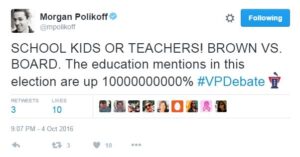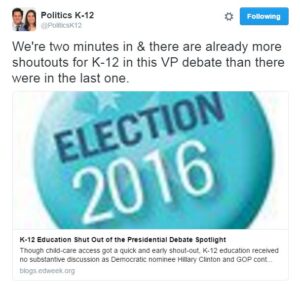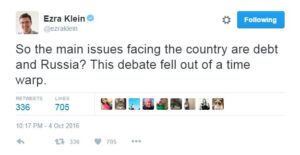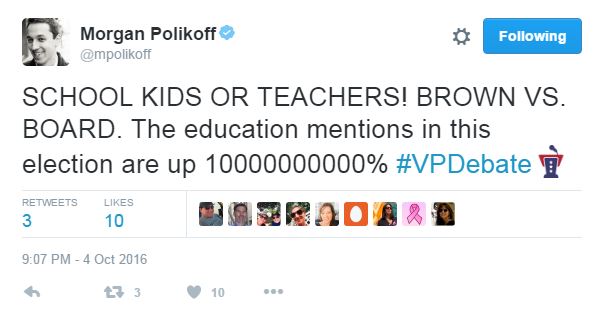Disappointed by the lack of conversation on education in the first presidential debate, I, like many of us in the education community, thought last night’s vice presidential debate would be the time for education to shine. In anticipation, I put together a list of education topics that I thought Tim Kaine and Mike Pence might mention and the likelihood that each topic might get some air time.
On most accounts, I was wrong. Turns out that, once again, education was not mentioned to debate specific education policy ideas. It was mentioned as an aside to other policy topics.
But the night did start off strong. The idea that education could be a theme throughout the debate seemed promising when Kaine talked about school segregation in his opening statement. The education Twitter-sphere went wild:


To drive home Clinton’s “stronger together” slogan, Kaine mentioned a high school student from Farmville, VA (where the debate was held), Barbara Johns, who led a walkout against school segregation 65 years ago. But Kaine telling this story wasn’t all that surprising: it’s a topic he’s mentioned several times since accepting the candidacy due to his family’s history fighting segregation in Virginia.
I did have desegregation on the list of education topics I thought might come up in the vice presidential debate, but I thought there was a low chance of it being mentioned. To be fair, Kaine didn’t mention desegregation in order to debate its policy value in bettering today’s schools (segregation is still a huge issue). Instead he brought it up to connect it to the Clinton campaign’s larger message of a united America.
In talking about Clinton’s economic plan, Kaine called for investing in education, including pre-K, teachers, debt-free college and tuition-free college “for families that make less than $125,000 a year.” Kaine and Pence touted their education funding investments during their time as governors as a way to prove their economic records. To take a stab at Trump for not paying taxes, Kaine criticized him for not investing in schools. And in order to undercut Trump’s immigration plan, Kaine said the plan would mean going from “school to school” and deporting undocumented immigrants.
The hot topic education issues I thought were very likely to be debated — including school choice, college access and affordability, early childhood education, and even career and technical education — did not merit a back and forth, apparently. Much of the night was instead focused on foreign policy, particularly our relationship with Russia, and national debt, making it feel like we weren’t in 2016:

A full transcript from the debate can be found here. The second presidential debate is this Sunday, October 9 at 9 p.m. Eastern. I will still hold out hope that the candidates vying for leadership of our nation will debate how our country should provide an equitable and excellent education for our children. However, the lack of conversation on the topic during the debates thus far doesn’t bode well for this hope.
October 5, 2016
Vice Presidential Debate Recap: Disappointing Show for Education
By Bellwether

Share this article
More from this topic
What the Supreme Court’s Mahmoud v. Taylor Decision Means for Schools and Families
Meeting the Moment: How 4 Philanthropic Foundations Are Stepping Up Right Now
Teaching Interrupted: How Federal Cuts Threaten a Promising Teacher Residency Program
No results found.